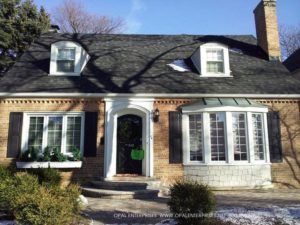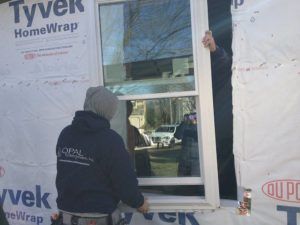Are your windows leaking? If you notice water on the inside of your window, it’s often challenging to pinpoint precisely where it is coming from. The source could be a leak in the wall or roof, a poorly installed window, or worn-out sealing components.
Yet, no matter the cause, it’s crucial to have it investigated and diagnosed by a licensed professional and ensure that it’s repaired quickly and correctly. Even small leaks can eventually grow into big ones if they’re ignored, and the encroaching moisture can lead to costly damage.
What Are Some Common Causes of Window Leaks?
There are several reasons your window could be leaking water or building up condensation. It could be the result of your window installation, insufficient maintenance, extreme weather, or even your home’s design. Here are other common causes of window leaks:
- Bad window sealant: If the caulk, or window sealant, around your window has gaps or cracks, you may experience dampness after a rainstorm.
- Inadequate or cracked glazing putty: If you notice that your windows are fogging or you can see water between your panes of glass, your double-glazed window may not be doing its job. The argon, or other insulating gas, has leaked out through the seal or a small hole or crack in your window. This doesn’t necessarily mean water is entering your home; however, your window has likely lost much of its energy efficiency properties.
- Leaks in your walls: If you see stains at the top part of your window frame, your leak may be coming from somewhere inside your walls.
- Exterior design issues: Improperly angled fascia boards above your windows or a lack of overhangs can cause wind-driven rainwater to enter your windows. Make sure your fascia boards are slanted away from your house.
- Poor installation: Breaks in the flashing or poorly installed windows may cause water to infiltrate your house. Ensure you hire a well-qualified remodeling company that takes pride in its work.
- Deterioration: Older windows may experience deterioration, including broken caulk at the window flange or a missing paint seal overlapping the window molding and glass.
How Can I Determine Where the Leak Is Coming From?
At one point or another, nearly all windows leak, which can be a significant issue due to mold concerns in your home. Mold and decomposition organisms require water to grow, and this growth is often out of view inside your walls.
To determine where your window leak is coming from:
- Check your window exteriors two times a year for damaged or peeling caulk
- Check the gasket or sealant between the window glass and the frame
- Double-paned windows will have a band of metal on each of the four sides to seal the glass itself. If this fails, moisture may appear between the glass panes
- Use a screwdriver to probe your wood frame while checking for soft wood that may be decaying
- Open the window and inspect the sash and frame. If it’s an inoperable window, check the underside as well.
- Look for discoloration on the walls near your window; this could indicate water damage.
If you discover decayed or damp wood, you should call a licensed professional to investigate further. If the leak has been happening for a while, the wall near your window may need to be opened and examined for mold.
How Can I Prevent My Windows from Leaking?
There are as many solutions for preventing a leaky window as there are causes. It may be as straightforward as putting in replacement weather stripping on your slider window or as complex as having to rebuild the wood in your wall.
Here are a few trouble-free ways to prevent your windows from leaking:
- Scrape away deteriorated or damaged exterior caulking, thoroughly clean your window frame, and reapply the caulking
- If the gasket between the glass and window frame have separated, reseal the gasket to the glass using clear silicone caulking
- Ensure your (the bottom flat part of your window) is pitched down to direct water away from your house.
- Check the weep holes at the bottom of your frame. Clean away dead insects, dirt, and debris from the holes. If necessary, use a wire to unplug them. When your window’s weep holes are unplugged, water that comes through the screen can drain back outside.
When to Consider Replacing Your Windows?
If your window is leaking excessively or is impacting the wall structure around it, contact a skilled window replacement specialist for a free evaluation and potential full-frame replacement.
A full-frame window replacement is the most comprehensive solution for your leaking window and will provide the most cost savings in the long run.
Leave it to your replacement contractors to identify the reason your windows are leaking. They can tell you if the issue originates from another part of the wall or the windows themselves.
Then, if necessary, they’ll remove rotten or damaged wood from the wall and frame and replace your old windows with brand-new energy-efficient ones.
Let Opal Enterprises Replace Your Leaky Windows
Ensuring your windows are correctly installed the first time is the easiest and best way to prevent your windows from leaking. Hire an experienced window replacement contractor from Opal Enterprises. When you need window installation service Arlington Heights window installers on our team are ready to install new windows so you don’t have any more leaks in your home.
Our friendly project consultants will examine your home’s windows and furnish you with a free replacement estimate. So whether you’re looking for wood, vinyl, fiberglass, or composite, we have the window you’re looking for. Get started by contacting Opal Enterprises today!





